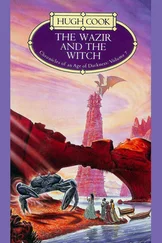Hugh Cook - The Witchlord and the Weaponmaster
Здесь есть возможность читать онлайн «Hugh Cook - The Witchlord and the Weaponmaster» весь текст электронной книги совершенно бесплатно (целиком полную версию без сокращений). В некоторых случаях можно слушать аудио, скачать через торрент в формате fb2 и присутствует краткое содержание. Жанр: Фэнтези, на английском языке. Описание произведения, (предисловие) а так же отзывы посетителей доступны на портале библиотеки ЛибКат.
- Название:The Witchlord and the Weaponmaster
- Автор:
- Жанр:
- Год:неизвестен
- ISBN:нет данных
- Рейтинг книги:5 / 5. Голосов: 1
-
Избранное:Добавить в избранное
- Отзывы:
-
Ваша оценка:
- 100
- 1
- 2
- 3
- 4
- 5
The Witchlord and the Weaponmaster: краткое содержание, описание и аннотация
Предлагаем к чтению аннотацию, описание, краткое содержание или предисловие (зависит от того, что написал сам автор книги «The Witchlord and the Weaponmaster»). Если вы не нашли необходимую информацию о книге — напишите в комментариях, мы постараемся отыскать её.
The Witchlord and the Weaponmaster — читать онлайн бесплатно полную книгу (весь текст) целиком
Ниже представлен текст книги, разбитый по страницам. Система сохранения места последней прочитанной страницы, позволяет с удобством читать онлайн бесплатно книгу «The Witchlord and the Weaponmaster», без необходимости каждый раз заново искать на чём Вы остановились. Поставьте закладку, и сможете в любой момент перейти на страницу, на которой закончили чтение.
Интервал:
Закладка:
Just as when his brother Morsh had suffered a broken leg, Guest was helpless, for he had made no study of the healing arts.
Of course, when Morsh had suffered his breakage, the wizard Sken-Pitilkin had been there to help. But where was Sken-Pitilkin now?
Downstairs, doubtless. Guest was half-moved to fetch him, but knew the thought immediately as madness. For the wizards Hostaja Sken-Pitilkin and Pelagius Zozimus would both be embroiled in battle, and no aid could be spared for a washerwoman when the lives of so many were in the balance.
So Guest could but gape uselessly at the turmoil of the woman's gaping-gasping, at her blood-moil clothing, at the red soakage darkening the shadows of her ribs. At 16 years of age, he knew his edged weapons, his tactics and his strategy; he knew the dynamics of patrolling and the logistic difficulties of provisioning an army on the march; he was fit to pillage, and plunder, and burn, and ravage; but in the face of the spillage of blood he was helpless.
Of course, Guest Gulkan should have known the way of wounds, as should we all, for we live in a great age of darkness in which the sword rules, and strikes with impunity at washerwomen and irregular verbs alike. So know then the wound! First one must look, for only by looking can one know. One must seek for the damage, remembering always that piercing weapons – one thinks in particular of a quarrel shot from a crossbow – will damage with both instrike and outstrike.
Having found hole or holes, raggages or cleavages, tears and rips, gouges and gaps, one must patch the same. And immediately!
Have you no bandage? Then your hand must serve! But unless one be naked, then one surely has bandages, for the cloth off one's back will serve when all else fails. The cleaner the cloth, the better, though the cleanest of cloth is no use to a washerwoman who has died of bloodloss while the ardent hygienist has been searching for sterility.
Say it of a certainty: in the face of bleeding, the rescuer must match the urgency of the pumping heart. The wound must be patched, and immediately.
So when you are at war, and your bloodbrother has his swordhand hacked away by a battleaxe, then do no hesitate. First kill the axe-wielder. Then wipe the filth of battle from the palm of your hand, and clamp that living flesh of yours to the pumping agony of your bosom friend. It can be done in moments, if you have the courage to save as well as to kill.
Press your hand to the hot wet pumpage of blood. Press hard, and crush the bloodflow down to nothing. Then keep your hand in place until some hard-panting hero of your acquaintance can spare a few moments from his saga-work to assist with a bandage. Then you had best seek the help of a healer, though the perversity of the world is such that you may find every available pox doctor to have been slaughtered in the first heat of battle.
If such be the case, then your friend's handless arm should for the moment be placed in a sling, so that the well-bandaged wound is kept elevated, for the heart finds it harder to pump blood to elevations. And – mind! – do not allow the wound to be dipped into liquid ordure, or steeped in boiling lead, or packed with red mud, or plunged into the sexual aperture of a menstruating cow.
For, while all such treatments have their vigorous adherents, they are spurious; and the truth is that the simplest treatments are the best. On the battlefield, a weapon-wound should be bandaged, and promptly, with bare flesh serving as a failsafe expedient in the absence of other facilities. Bandage, then – and by promptly rendering a service so simple, you may yet save a life in the heat of war.
There!
It is so simply put!
But did Guest Gulkan know as much?
The unfortunate fact is that the Weaponmaster's brawning courage was much facilitated by his steadfast refusal to contemplate the obvious and inevitable consequences of carnage.
Much did he think of the clash of swords, the brawling of battleaxes, and the winning of glory. But of bloody pain and the sweatwrenching agony of a washerwoman's death – of these he remained steadfastly ignorant.
True, he had seen his brother Morsh Bataar hideously wounded.
But he had relegated all memories of that wounding to those mysterious and labyrinthine depths of his brain where legions of hapless irregular verbs wandered in doomed oblivion. Yes, and he had been wounded himself, and grievously – for the bamboo spike which had sabotaged his foot at the Battle of Babaroth had caused him a great deal of agony and inconvenience. But this too he had managed to shrug off and forget.
So, thanks to his own willed ignorance, Guest Gulkan stood watching as a woman died, and the charity of his pity was no help to her, for pity without action is useless.
And if you believe yourself likewise doomed to go to war, then know this of a certainty: if your study in its folly concerns itself with the mere use of weapons then you too are doomed to stand some day in helpless guilt, watching as the object of your pity dies. So let this text then carry an explicit message, a message apt for our age of ceaseless warfare: those who would study the use of weapons should study likewise the cure of that use.
Above is set a sermon on bandaging, and it will serve you well if you should look up from this page to see a friend come stumbling through the door with a hand missing. Clamp the palm of your hand to the spouting stump, and apply firm pressure!
But of course there is more to the treatment of wounds than this, for a missing hand is simplicity itself, whereas damage to the pancreas is a more delicate matter (for all experts agree that the soul, if it is located anywhere, is surely to be found in the pancreas, since this organ promptly dissolves itself upon death), and the eye is likewise delicate, the treatment of its damage being a matter only to be studied under the close supervision of an accomplished expert.
Consider then a case more complex than mere amputation.
Suppose you are fighting in the red dust of Dalar ken Halvar, and that your friend has been eviscerated by a broadsword. Suppose too that a pariah dog has eaten one half of his liver; that a goodly portion of his forebrain has spilt down his face like so much spoilt porridge; that one of his eyes has been plucked from its perch by a battlefield vulture, and that the other is resting on his cheek in the bloody mess of its swordpoint evisceration.
What would you do?
Or, to take another case, how would you aid a friend who has been speared most piteously in the anus, assuming that the pair of you are marooned by blizzard in the mountains of Ibsen-Iktus.
Assume too that all food is gone, that your tent is in tatters, and that your friend's incidental frostbite has led to his left leg becoming one single bloated mass of gangrenous stench-flesh.
How would you treat your friend?
Or would you treat him not, but simply content yourself with the stealing of his boots, and the making of a joke about him after his death and his snowfall burial?
If you cannot give firm answers to such questions, then it is arguable that you are unfit to go to war.
And what too would you do were your friend burnt from waist to throat by the fire of a dragon? Or burnt below the waist, which is arguably worse? And are you aware that the fire of the imperial dragons of Yestron is sticky, and cannot be removed by rubbing or clawing, but inevitably eats its way through to the bone?
And have you treatments for malaria, or hepatitis, or typhus, or bubonic plague, or syphilis, or gonorrhoea, or any of those other ailments which are the common property of an army on the march? And know you recipes of genocide apt for the mass murder of the rat and the flea? And which biting insect is it which carries typhus, and what are the symptoms of that disease, and what its treatment? And to remove a bloated tick from human flesh, does one wind it deasil or withershins? And what will you do if the tick has invaded the ear?
Читать дальшеИнтервал:
Закладка:
Похожие книги на «The Witchlord and the Weaponmaster»
Представляем Вашему вниманию похожие книги на «The Witchlord and the Weaponmaster» списком для выбора. Мы отобрали схожую по названию и смыслу литературу в надежде предоставить читателям больше вариантов отыскать новые, интересные, ещё непрочитанные произведения.
Обсуждение, отзывы о книге «The Witchlord and the Weaponmaster» и просто собственные мнения читателей. Оставьте ваши комментарии, напишите, что Вы думаете о произведении, его смысле или главных героях. Укажите что конкретно понравилось, а что нет, и почему Вы так считаете.












